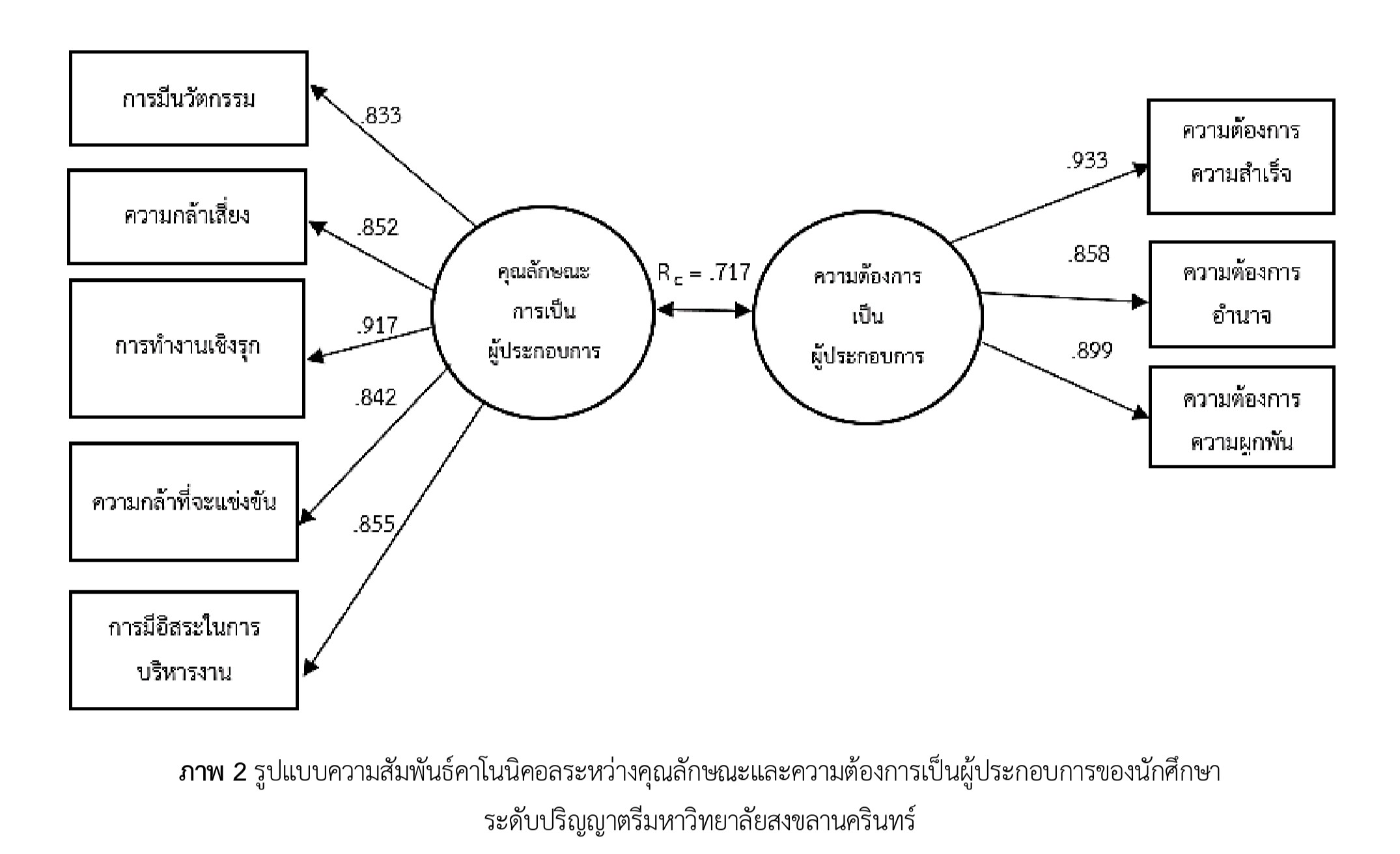Canonical Correlation Analysis between Characteristics and Entrepreneurship Desires of Undergraduate Students of Prince of Songkla University
DOI:
https://doi.org/10.14456/psruhss.2024.30Keywords:
Canonical correlation analysis, Characteristics, Entrepreneurship requirementsAbstract
This research aims to 1) study the level of entrepreneurial attributes and entrepreneurial needs of Prince of Songkla University undergraduate students 2) study the canonical correlation between entrepreneurial attributes. and entrepreneurial needs of students Bachelor's degree, Prince of Songkla University Examples used in research Undergraduate student, Prince of Songkla University Pattani Campus, 121 people. The tools used for data collection were questionnaires. The results of the research were as follows: 1) The level of entrepreneurial attributes and entrepreneurial needs of the Prince of Songkla University's undergraduate students. Overall, it is at a high level. When considering each aspect, it was found that the aspect with the highest average was the aspect of autonomy in administration and 2) Canonical correlation analysis found that entrepreneurial attributes were associated with entrepreneurial desires of .717 with statistical significance at .01 level. The relationship between the two sets of variables could be explained in a hundred ways. 51.40 each (R2 = .514) by operator attribute variable set. with a canonical weight between .833 - .917, consisting of proactive risk-taking In terms of having independence in administration innovation and the courage to compete respectively; The canonical weight value is between .858 - .933, consisting of the need for success. need for commitment and power requirements, respectively.
References
กรมพัฒนาธุรกิจการค้า. (2563). ข้อมูลการจดทะเบียนธุรกิจ เดือนพฤษภาคม 2563. สืบค้น 30 มิถุนายน 2563, จาก https://www.dbd.go.th/
ฉัตรศิริ ปิยะพิมลสิทธิ์. (2544). การแปลความหมายสัมประสิทธิ์สหสัมพันธ์และสัมประสิทธิ์การอธิบาย. สืบค้น 30 มิถุนายน 2563, จาก http://www.watpon.com/Elearning/stat23.htm
ประพนธ์ เล็กสุมา. (2555). รูปแบบและกลยุทธ์การดาเนินธุรกิจค้าปลีกเครื่องเขียนของผู้ประกอบการรายย่อยในเขตอำเภอเมืองนครปฐม (วิทยานิพนธ์ปริญญามหาบัณฑิต). นครปฐม: มหาวิทยาลัยศิลปากร.
ภัทรานิษฐ์ สรเสริมสมบัติ, วราวุธ ฤกษ์วรารักษ์, จารุวรรณ แดงบุบผา, และณัฐเชษฐ์ พูลเจริญ. (2560). ปัจจัยด้านจิตวิทยาที่ส่งผลต่อการเริ่มต้นธุรกิจของผู้ประกอบการโรงแรมในประเทศไทย. วารสารวิทยาการจัดการ มหาวิทยาลัยราชภัฎเชียงราย, 12(2), 17-41.
มหาวิทยาลัยสงขลานครินทร์วิทยาเขตปัตตานี งานทะเบียนและสถิตินักศึกษา. (2564). Student Summary. สืบค้น 30 มิถุนายน 2563, จาก https://regist.pn.psu.ac.th/main/
วันวิสาข์ โชคพรหมอนันต์, และวิโรจน์ เจษฎาลักษณ์. (2558). คุณลักษณะของผู้ประกอบการที่มีต่อความสำเร็จในการดำเนินธุรกิจของผู้ประกอบการร้านค้าในตลาดน้ำดอนหวาย จังหวัดนครปฐม. VeridianE-Journal,SilpakornUniversity (มนุษยศาสตร์สังคมศาสตร์และศิลปะ), 8(2), 967-988.
สมคิด บางโม. (2555). การเป็นผู้ประกอบการ Entrepreneurship (พิมพ์ครั้งที่ 5). กรุงเทพฯ: เอส เค บุ๊คส์.
สำคัญสุด สีหตุลานนท์. (2560). ปัจจัยแวดล้อมที่เกื้อหนุนต่อการเป็นผู้ประกอบการรุ่นเยาว์ กรณีศึกษา นักศึกษาคณะวิทยาการจัดการ มหาวิทยาลัยศิลปากร วิทยาเขตสารสนเทศเพชรบุรี (วิทยานิพนธ์ปริญญามหาบัณฑิต). เพชรบุรี: มหาวิทยาลัยศิลปากร.
สำนักงานคณะกรรมการพัฒนาการเศรษฐกิจและสังคมแห่งชาติ. (2560). สรุปสาระสำคัญแผนพัฒนาเศรษฐกิจ และสังคมแห่งชาติฉบับที่ 12 พ.ศ. 2560 – 2564. สืบค้น 30 มิถุนายน 2563, จาก http://www.onwr.go.th/?page_id=4172
สำนักงานเลขาธิการสภาผู้แทนราษฎร. (2558). วาระปฏิรูปที่ 15 : การสร้างสังคมผู้ประกอบการ. กรุงเทพฯ: สำนักงานเลขาธิการสภาผู้แทนราษฎร.
สำนักงานส่งเสริมวิสาหกิจขนาดกลางและขนาดย่อม. (2560). ทำความรู้จักกับ SME ไทย. สืบค้น 30 มิถุนายน 2563, จาก http://www.ubu.ac.th/web/files_up/03f2017052114185579.pdf
สุธาทิพย์ จันทร์เจริญผล, และวิโรจน์ เจษฎาลักษณ์. (2558). อิทธิพลของการมุ่งเน้นความเป็นผู้ประกอบการและการมุ่งเน้นการตลาดที่มีต่อการตอบรับจากลูกค้า และความได้เปรียบทางการแข่งขันของกิจการร้านยาในจังหวัดนครปฐม. วารสารวิชาการ Veridian E-Journal, Silpakorn University สาขามนุษยศาสตร์ สังคมศาสตร์และศิลปะ, 8(1), 1176-1191.
สุธีรา อะทะวงษา. (2556). คุณลักษณะที่สำคัญของการเป็นผู้ประกอบการวิสาหกิจขนาดกลางและขนาดย่อม. ศรีปทุมปริทัศน์ ฉบับมนุษยศาสตร์และสังคมศาสตร์, 13(1), 176-183.
Cooper, D. R., Schindler, P. S., & Sun, J. (2006). Business Research Methods (9th Ed.). New York: McGraw-hill.
Covin, J. G., & Slevin, D. P. (1991). A conceptual model of entrepreneurship as firm behavior. Entrepreneurship Theory and Practice, 16(1), 7-25.
Embi, N. A. C., Jaiyeoba, H. B., & Yussof, S. A. (2019). The effects of students’ entrepreneurial characteristics on their propensity to become entrepreneurs in Malaysia. Education + Training, 61(7/8), 1020-1037.
Indriyana, F., & Djastuti, I. (2018). Work values of generation Y. Diponegoro International Journal of Business, 40(1), 40-48.
Lumpkin, G. T., & Dess, G. G. (1996). Clarifying the entrepreneurial orientation construct and linking it to performance. Academy of Management Review, 21(1), 135-172.
Miller, D. (1983). The correlates of entrepreneurship in three types of firms. Management Science, 29(7), 770-791.
Sherry, A., & Henson, R. (2005). Conducting and Interpreting Canonical Correlation Analysis in Personality Research: A User-Friendly Primer. Journal of Personality Assessment, 84(1), 37-48.
Yamane, T. (1967). Statistics: An introductory analysis. New York: Harper and Row.

Downloads
Published
How to Cite
Issue
Section
License
Copyright (c) 2024 Humanities and Social Sciences Journal of Pibulsongkram Rajabhat University

This work is licensed under a Creative Commons Attribution-NonCommercial-NoDerivatives 4.0 International License.
Any articles or comments appearing in the Journal of Humanities and Social Sciences, Rajabhat Phibulsongkram University, are the intellectual property of the authors, and do not necessarily reflect the views of the editorial board. Published articles are copyrighted by the Journal of Humanities and Social Sciences, Rajabhat Phibulsongkram University.








